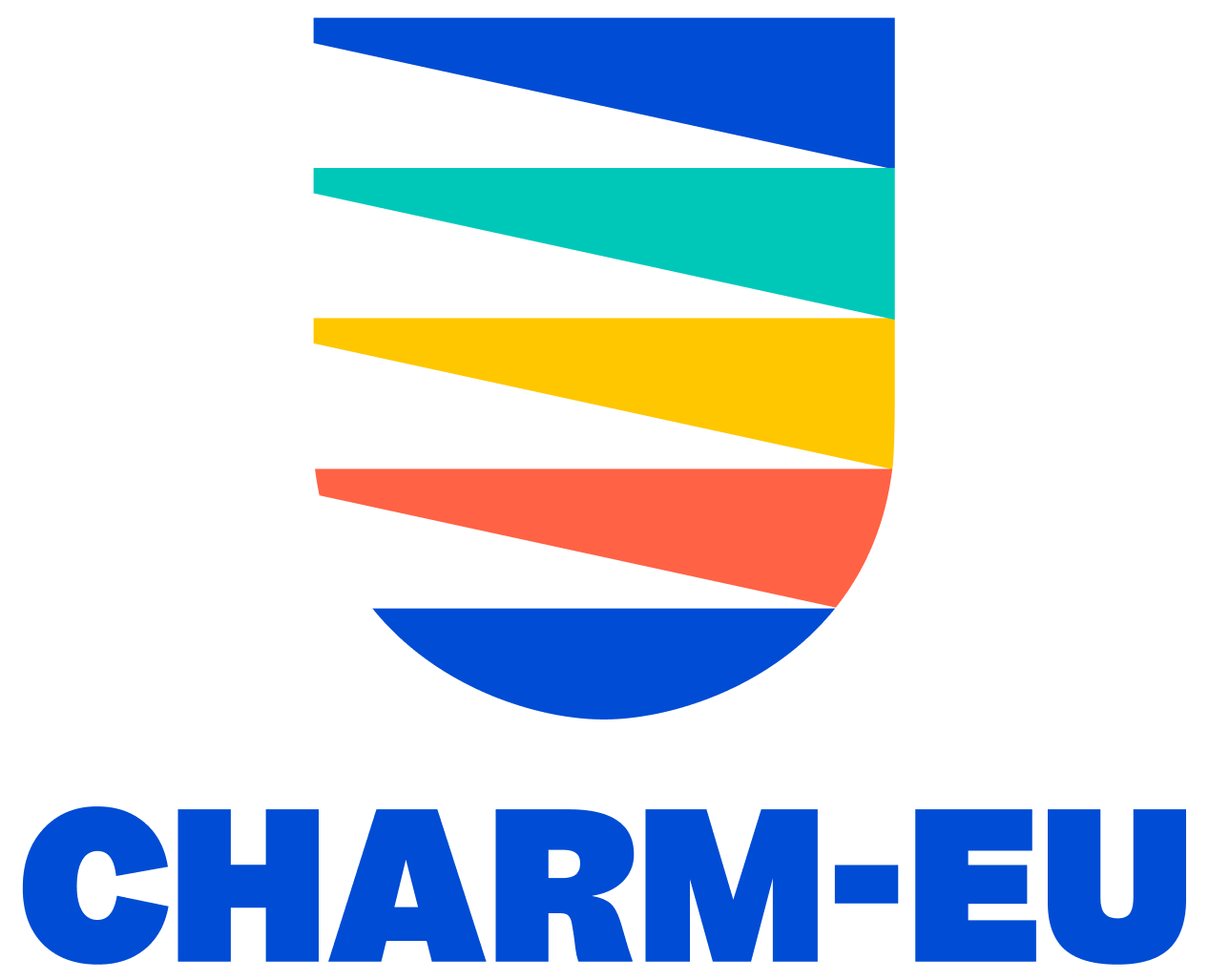Below the 15 capstone projects of the students from the 3rd edition of the master’s programme:
CHALLENGE 1: Budapest, the City of Spas
Students: Maever Trainor, Clothilde Raysseguier, Anya can der Vleuten and Emily Ho
Stakeholder: Andrea Velich (Eötvös Loránd University), Szilvia Czinefge (Budapesti Gyógyfürdők és Hévízek)
Academic Supervisor: Andrea Velich and Attila Varga (Eötvös Loránd University)
Second reader: Annisa Triyanti (Utrecht University)
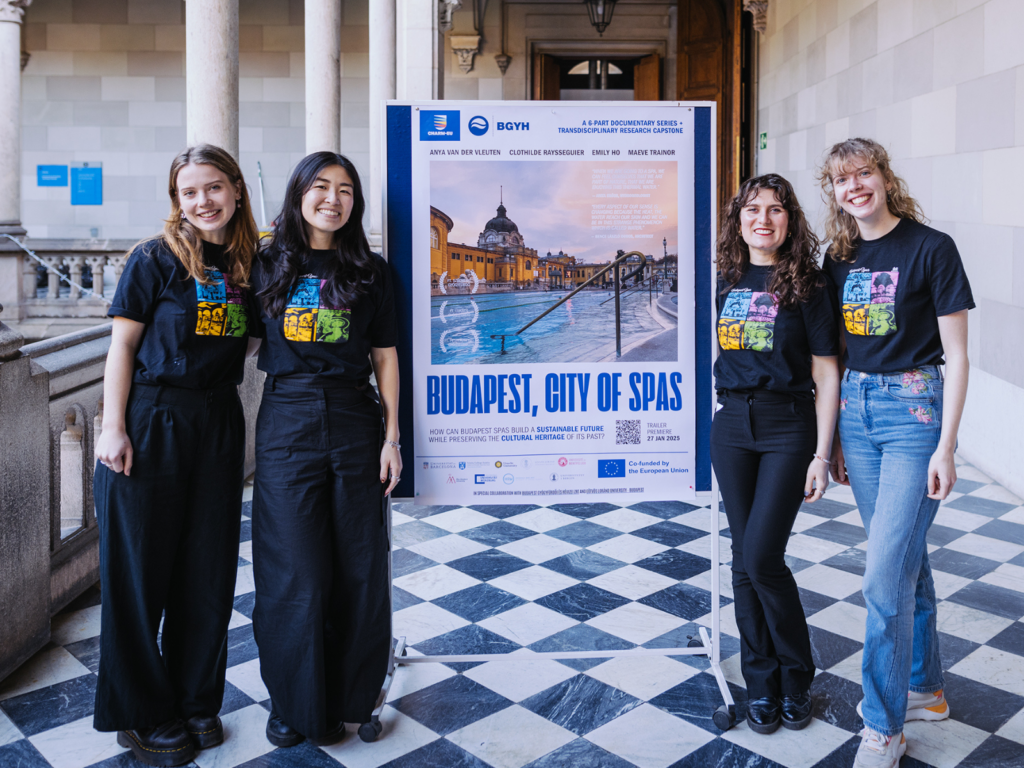
Description: Budapest, a city historically defined by her thermal springs and consequent bathing culture, is at a crossroads in the twenty-first century. Facing climate change and water-related extreme weather events, the Budapest Spas must strive for sustainability while maintaining their rich cultural heritage. This Capstone project links cultural heritage and sustainability through transdisciplinary research, emphasizing the need for conscious visitors and a sustainable space created by the company.
CHALLENGE 2: Budapest, the City on the Danube: promoting sustainable water management and create innovations (like the NB-MAR solution)
Students: Jonas Hessling, Alex Lucas Braggins Montero, Loïs Besselink, Luca Klapper
Stakeholder: Andrea Velich (Eötvös Loránd University), Balázs László, Sustainability Department of the Budapest Waterworks Holding (Fővárosi Vízművek)
Academic Supervisor: Andrea Velich and Attila Varga (Eötvös Loránd University)
Second reader: Anita Erőss (Eötvös Loránd University)
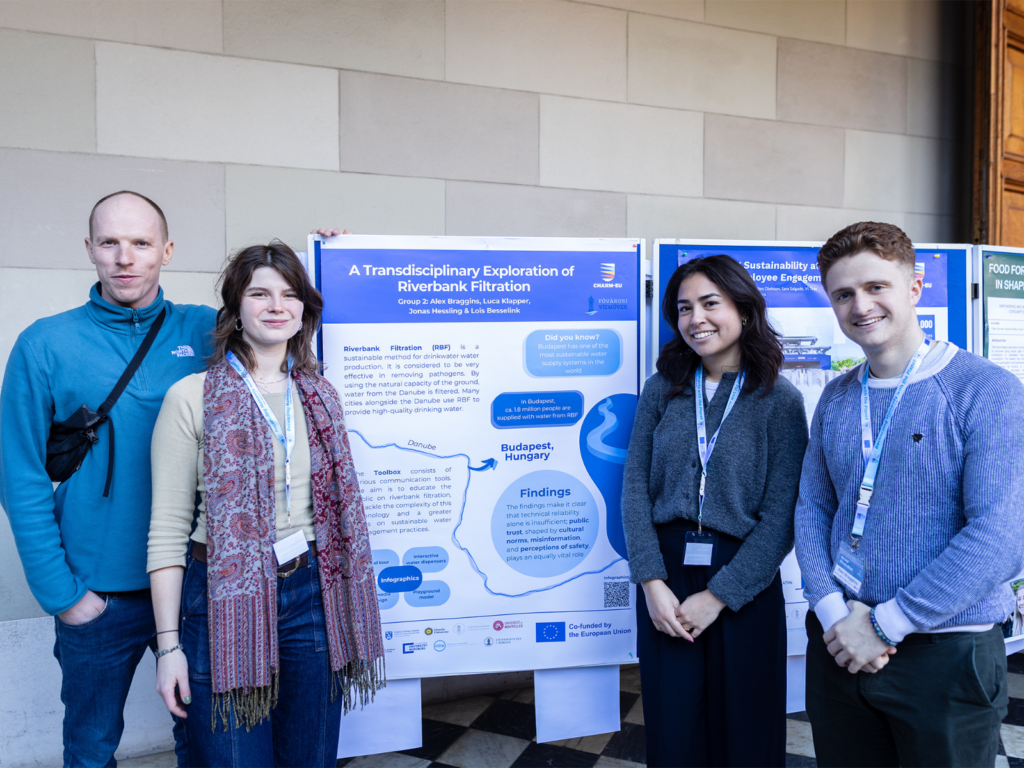
Description: Changing water cycles are the result of global change. Extreme weather events such as droughts, floods and torrential rains ask for sustainable water management practices. Budapest Waterworks used Riverbank Filtration (RBF) to filter the water from the Danube River into high quality tap water. This Capstone project aims to assess this filtering technique through a transdisciplinary approach. In this case, resilience, technological aspects, understanding water consumption patterns and public engagement with RBF are investigated. The result is a holistic solution that improves water security, resilience and fosters greater public trust and involvement in Budapest’s water system.
CHALLENGE 3: Food for Thought: Engaging Irish Youth in Shaping Sustainable Food Systems
Students: Taylor Tulissi, Filippo Carminati, Rachel McCaffery, Pablo Weber Garcia
Stakeholder: Aoibhín Heslin, Airfield Estate
Academic Supervisor: Nandini Gupta (Trinity College Dublin)
Second reader: Alexander Bönner (Rughr West University of Applied Sciences)
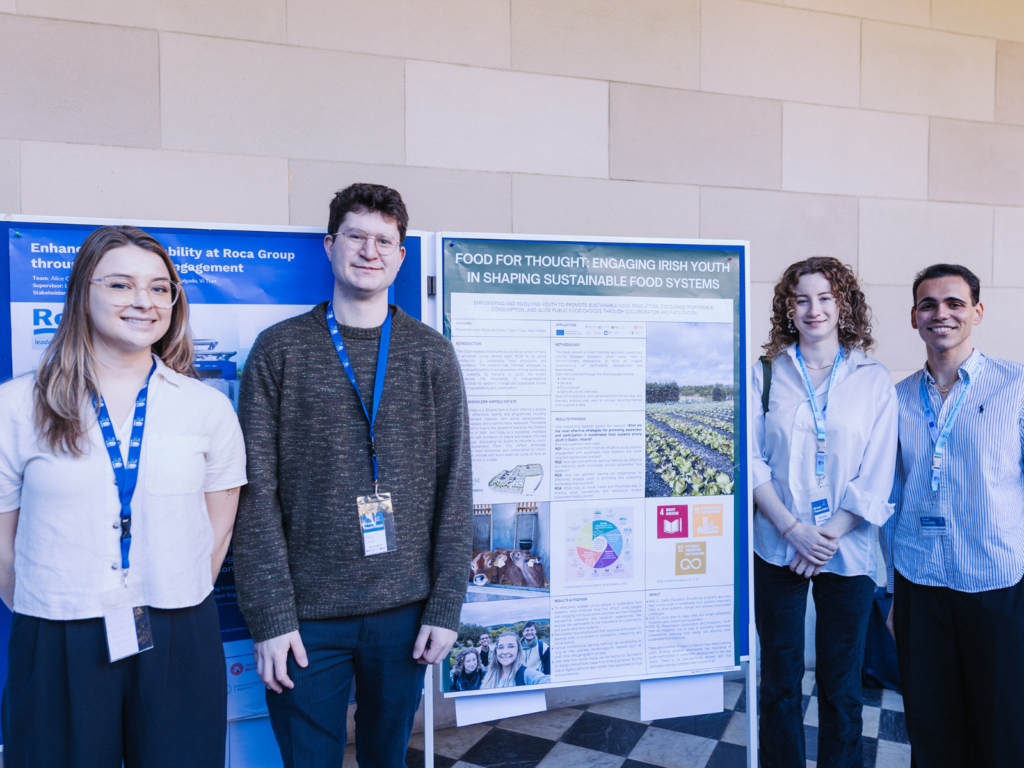
Description: This Dublin-based project aims to provide a number of tools to empower young people to be active contributors to sustainable food production and consumption. Aligned with UN Sustainable Development Goals (SDGs), particularly SDG 11 (Sustainable Cities and Communities) and SDG 12 (Responsible Consumption and Production), the initiative provides strategies that can be used to foster awareness and leadership among youth. With a vision of Dublin becoming a sustainable food city, the project leverages nuanced education strategies to promote participation in and awareness of local sustainable food systems. By focusing on youth, the project emphasizes the importance of intergenerational collaboration for systemic change and sustainable futures rooted in accessibility and collaboration.
CHALLENGE 4: How can we promote the spread of sustainable agriculture in Sub-Saharan Africa by enabling Restoration Champions to tell their stories better?
Students: Damian Penco, Zara Hussey, Kevin Schroeder, Alice Van Hamme
Stakeholder: Wessel van Eeden, World Resources Institute
Academic Supervisor: Nandini Gupta (Trinity College Dublin)
Second reader: Padraig Carmody (Trinity College Dublin)
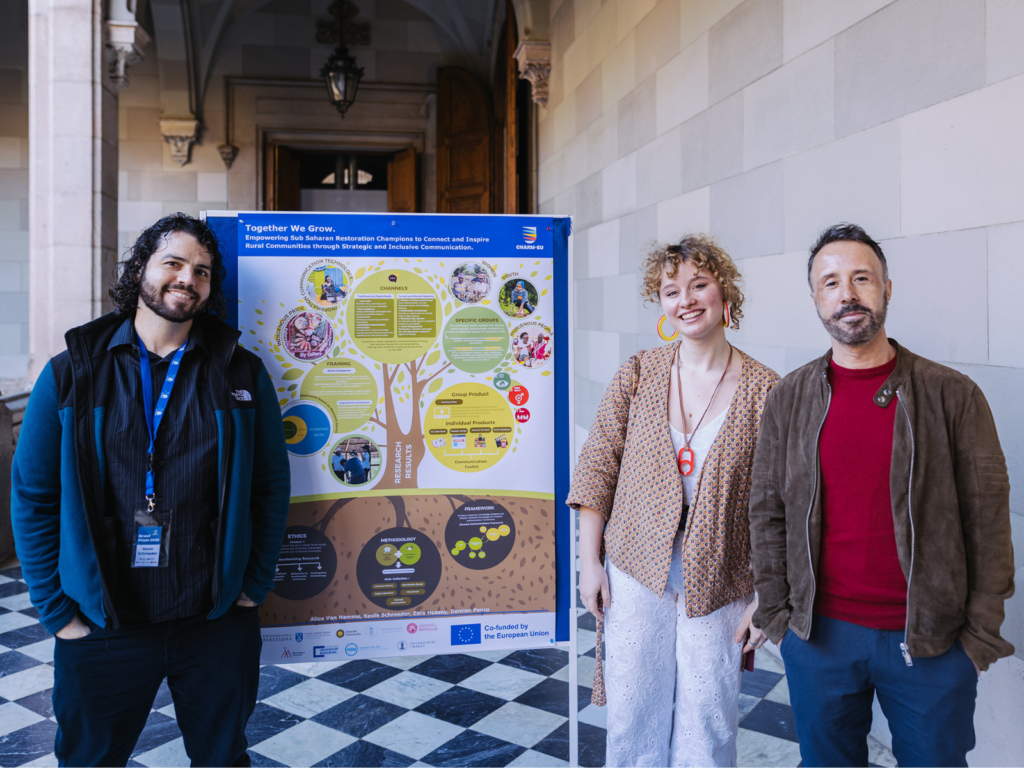
Description: This project is developed in partnership with the World Resources Institute (WRI), focusing on actionable strategies to combat environmental challenges, with an emphasis on scaling up restoration initiatives to restore degraded landscapes. Our goal is to develop a scalable and adaptable communication toolkit tailored to support restoration This project is developed in partnership with the World Resources Institute (WRI), focusing on actionable strategies to combat environmental challenges, with an emphasis on scaling up restoration initiatives to restore degraded landscapes. Our goal is to develop a scalable and adaptable communication toolkit tailored to support restoration initiatives across Sub-Saharan Africa. By focusing on proper framing and contextual relevance, this toolkit ensures that messages are both impactful and resonate with local communities to global stakeholders. This initiative aligns most with Sustainable Development Goals (SDGs) 2, 5, 8, and 15. The primary objective is to empower local restoration efforts and NGOs by equipping them with tools and strategies to communicate their work and its impact more effectively. The project aims to amplify local voices, foster collaboration, and attract greater support for restoration activities. Ultimately, the focus on framing and scalability maximizes the visibility and influence of restoration efforts, ensuring long-term success.
CHALLENGE 5: Reviving the Mediterranean: How Barceloneta’s Aquatic Businesses Can Drive SDG 14
Students: Roxanne Hendrix, Carolina Veloso Ferreira, Nina van der Hijden, Thirza Bakker, Nelli Piehl
Stakeholder: Berta Felipe Benavides and Carlos Mallo Molin, Innoceana
Academic Supervisor: Miquel Canals and Manel Gazo (University of Barcelona)
Second reader: Anastasia Tsvetkova (Åbo Akademi University)
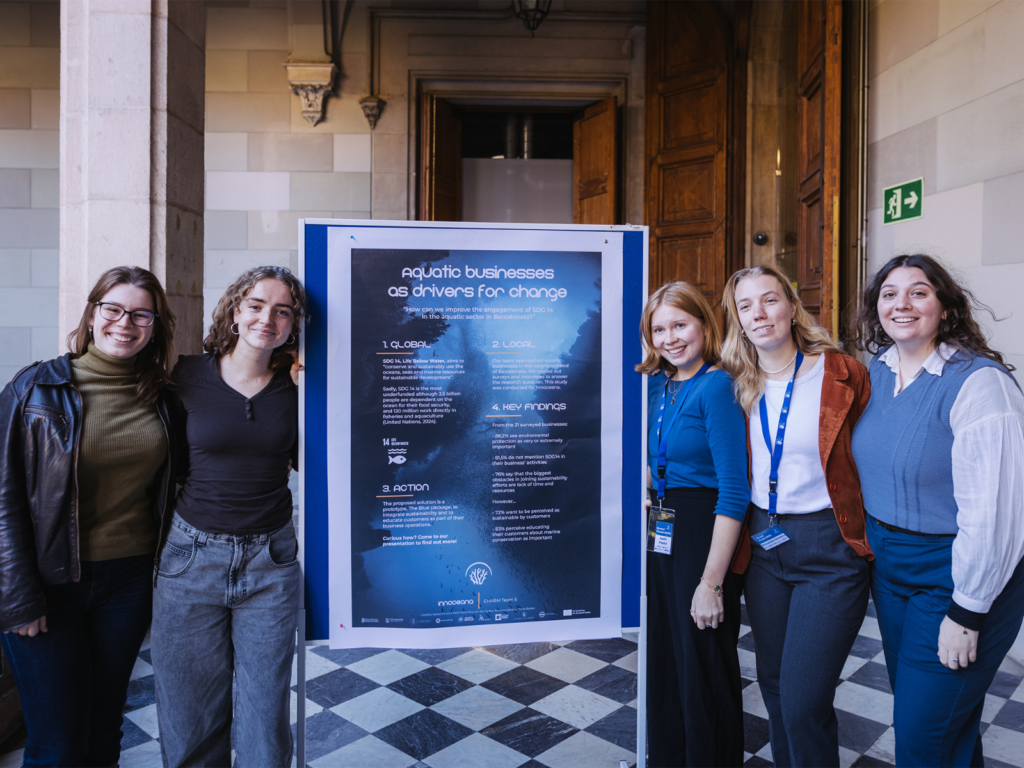
Description: The Mediterranean Sea is facing several environmental challenges, including pollution and biodiversity loss, which threaten ecosystems and the communities that depend on them. This project researches how aquatic businesses in Barceloneta can contribute to addressing these issues by engaging with Sustainable Development Goal 14: Life Below Water, which focuses on conserving and sustainably using marine and we coastal ecosystems. In collaboration with the NGO Innoceana, which works to advance SDG 14 and foster networks with local businesses, the research examines current environmental practices, engagement strategies, the local blue economy, the role of the government, and measurement tools. Through surveys and interviews, the study explores what practical solutions can play a role. By fostering the partnership with Innoceana, this research aims to strengthen the connection between businesses, offering practical recommendations for improving sustainability in the Barceloneta neighborhood.
CHALLENGE 6: Co-creating a sustainability engagement toolkit for Roca Group: Enhancing employee involvement in sustainability efforts
Students: Stina Ellen Victoria Olofsson, Vi Tran, Alysha Harnam, Sara Salgado, Alice Casella
Stakeholder: Miguel Angel Heras, Roca Group
Academic Supervisor: Liz Arroyo (University of Barcelona)
Second reader: Magnus Hellström (Åbo Akademi University)
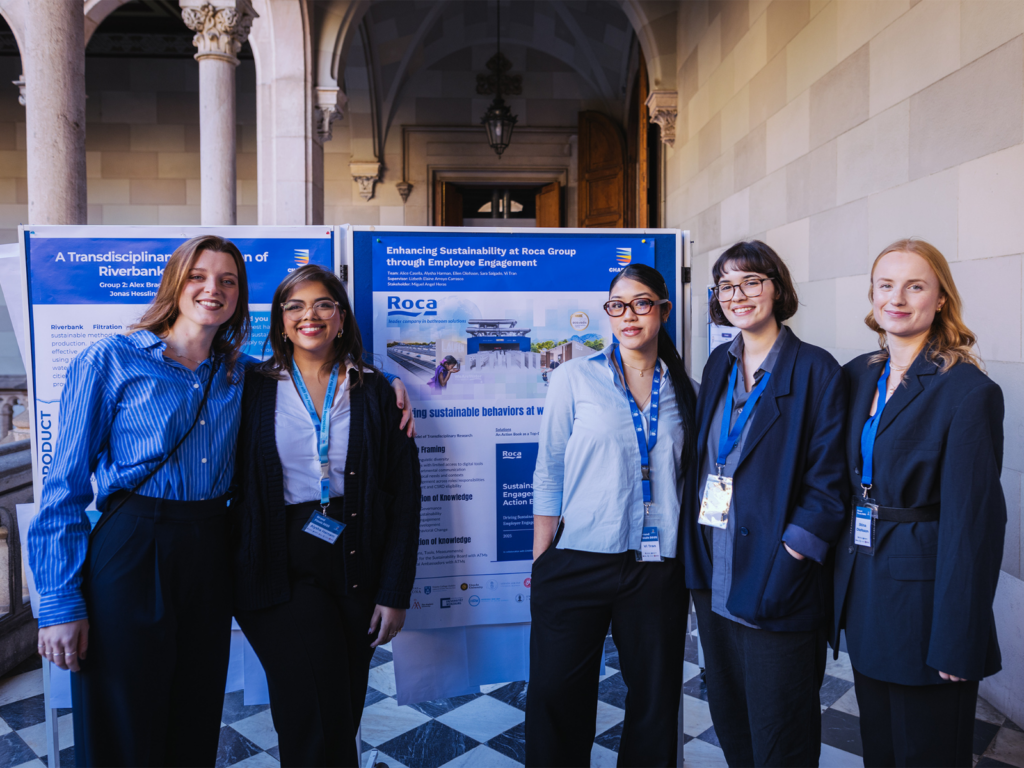
Description: The Roca Group, a global leader in bathroom products, faces the challenge of integrating sustainability practices across its diverse workforce, both in office and factory settings. The aim is to bridge the gap between top-down sustainability directives and bottom-up employee engagement, fostering genuine corporate sustainability. The proposed solution is a sustainability toolkit that includes a self-assessment tool to evaluate local strengths and weaknesses, paired with a program development guide to tailor interventions to the unique needs of each location. By integrating key sustainability dimensions—behavioral change, training, operational practices, governance, and community engagement—the toolkit aims to empower employees and leadership alike, driving meaningful and measurable sustainability transformations throughout Roca.
CHALLENGE 7: Driving Sustainability: Defining strategies for a Sustainable future at Escuder
Students: Sophie van de Water, Emma Egresits, Anabel Meyer, Isabel Giorgioni, Kristiana Qerosi
Stakeholder: Esther Segovia, Lidia Felices & María Martinez, Sucesores de José Escuder, S.L.
Academic Supervisor: Monica Martinez Lopez and Alejandro Calderon Díaz (University of Barcelona)
Second reader: Viktor Mihucz (Eötvös Loránd University)
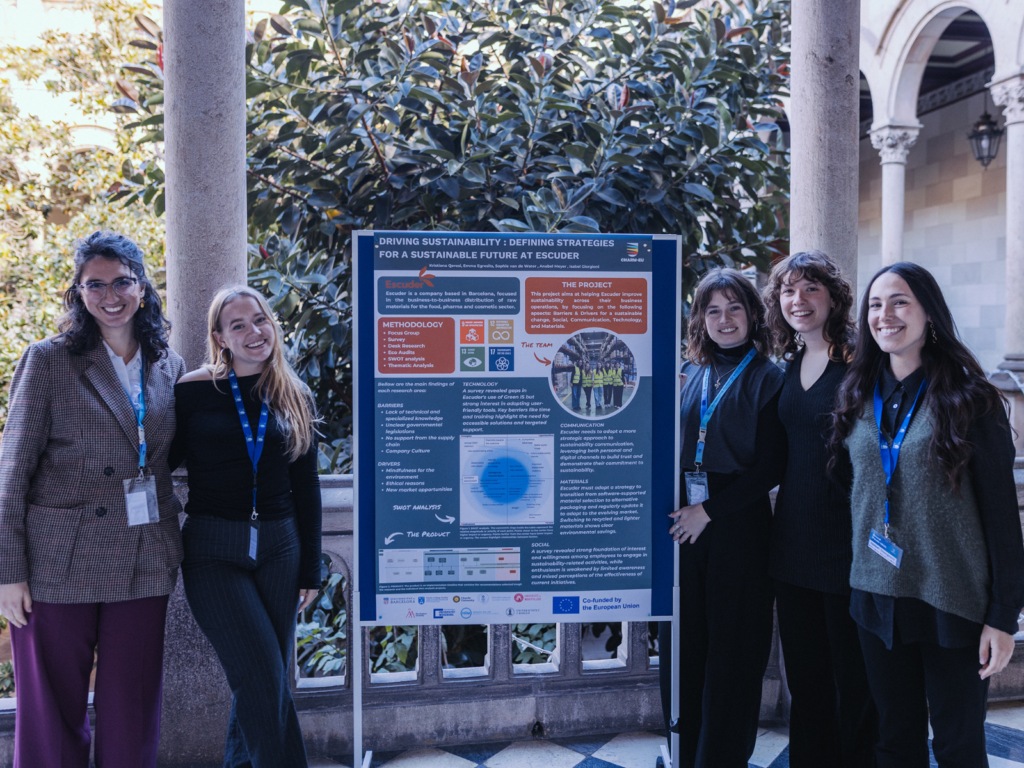
Description: In today’s business landscape, integrating sustainability into the core value of a company is no longer an option. Escuder is dedicated to embedding environmental responsibility into every part of its operations. As a leading distributor of raw materials for the cosmetics, pharmaceutical, and food sectors, Escuder recognizes its important role in driving positive change and advancing for sustainable practices across the industry. Our mission focuses on enhancing sustainability practices through targeted short- and long-term strategies. Focusing on five main areas, being optimizing material use, improving communication, innovating business models, fostering a sustainable corporate culture, and adopting advanced technologies, we are looking forward to help Escuder strives to create meaningful change. By focusing on these goals, the company seeks to reduce its environmental impact, improve operational efficiency, and foster positive social contributions. Together, we aim to shape a more sustainable and eco-friendly future, benefiting both the industry and society.
CHALLENGE 8: Barriers and enablers of Carbon farming – Pruning residues and biochar applications in Mediterranean, peri-urban agriculture as a case study: Baix Llobregat Agrarian Park, Catalunya
Students: Rachel Nel, Eliana Catgiu, Clara Lerch, Manuel Kaminsky
Stakeholder: Helena Perxacs Motgé & Guillem Caparro, Consorci del Parc Agrari del Baix Llobregat
Academic Supervisor: Pierre Hohmann (University of Barcelona)
Second reader: Jose García/ Joan Romanya (University of Barcelona)
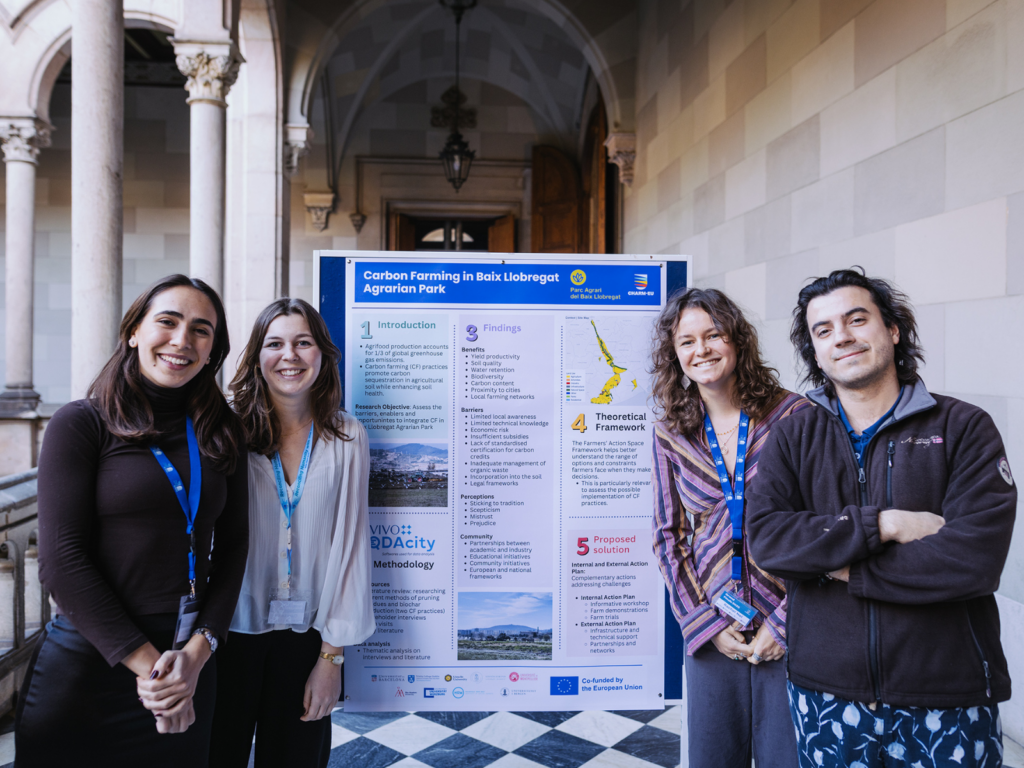
Description: The Baix Llobregat Agrarian Park (BLAP), a peri-urban agricultural area spanning 3,473 hectares near Barcelona, is home to approximately 330 farmers producing fresh fruit and vegetables for local markets. However, this Mediterranean farmland faces escalating threats from climate change, including prolonged droughts and extreme weather events, such as the 2020 Storm Gloria, that threaten crop yields and therefore the economic viability of farms. This pushes the involved stakeholders to develop climate-smart solutions that enhance agricultural resilience in the long term. To address these vulnerabilities, this Capstone project investigates the feasibility of applying pruning residues and biochar soil amendments as pivotal Carbon Farming practices to enhance soil carbon sequestration and build farm resilience in the Baix Llobregat Agrarian Park. The research tries to explore different aspects that influence the implementation feasibility – from environmental, regulatory and economic, to social aspects. Stakeholder engagement is central to the challenge, involving interviews and collaboration with internal and external stakeholders, most noticeably local farmers and cooperatives, to identify barriers, drivers, and opportunities for adoption.
CHALLENGE 9: Navigating Marine Conservation with a Community Focus: A Strategic Roadmap for The Lost Compass in Vanuatu
Students: Sílvia Graells, Luisa Krakau, Laia Alonso Carbó, Marcelo Starobinas
Stakeholder: Mathieu Bourgarel, The Lost Compass
Academic Supervisor: Patricia Cucchi (University of Montpellier)
Second reader: Montserrat Camps (University of Montpellier)
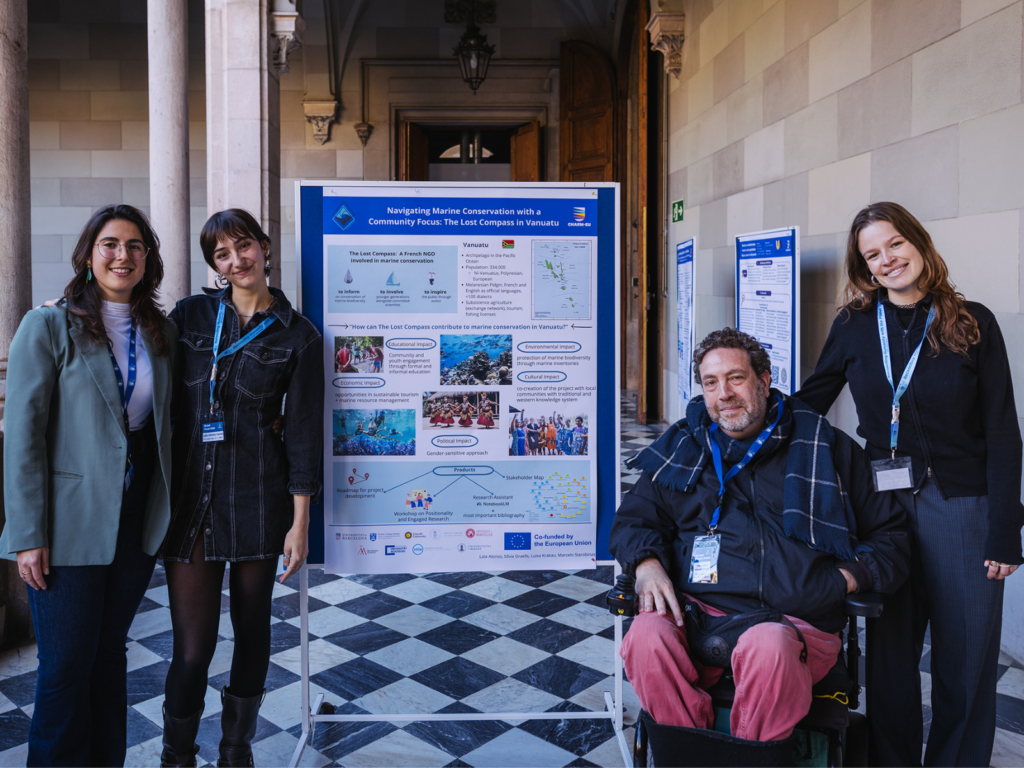
Description: Vanuatu, a small island nation in the Pacific, is a hotspot or marine biodiversity. Its ecosystems are facing significant threats from both natural and human-induced factors, including cyclones, overfishing and the worse consequences of climate change, such as rising sea levels, marine heat waves and ocean acidification. The Lost Compass (TLC), a French NGO, is planning a medium to long-term initiative aimed at supporting marine conservation efforts through data collection expeditions. To ensure the project’s success and secure funding, they must first gain a thorough understanding of the local context and establish strategic partnerships with both local and international organisations. Our team has conducted a prospective study on their behalf, identifying and talking to stakeholders, selecting relevant literature and putting together a roadmap to assist them in their new initiative.
CHALLENGE 10: WOc Living Lab 3M: Transition towards Sustainable, Local Food-producing Agriculture in the Montpellier Metropolitan Area
Students: Lisha Cao, Julien Jonis, Luke Ashton, Jana Tüting
Stakeholder: Justine Bassoul & Olivier Barreteau, University of Montpellier
Academic Supervisor: Valerie Borrell (University of Montpellier)
Second reader: Geoffroy Lesage (University of Montpellier)
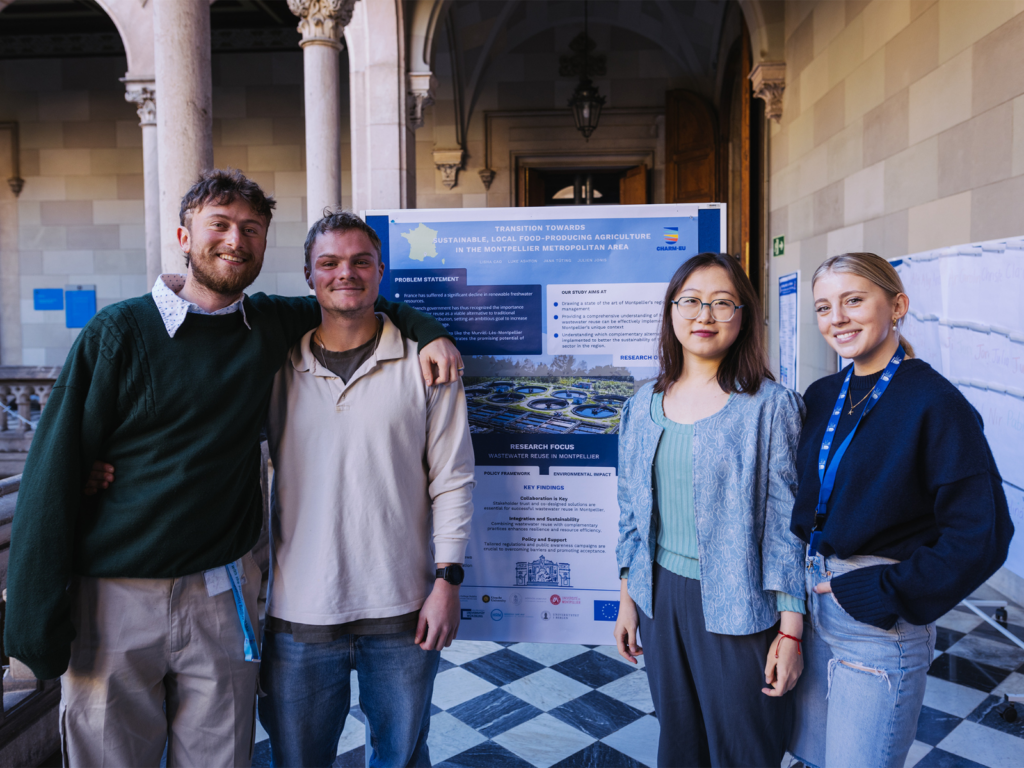
Description: The Occitanie region of France is facing a growing water scarcity issue, exacerbated by climate change. This project aims to explore the feasibility of utilizing a wastewater reuse system for small-scale agriculture, fed by a biological treatment facility in peri-urban Montpellier. Along with feasibility studies on social, economic, political and environmental dimensions, the project will also explore complimentary water saving techniques with the aim of producing a local holistic approach to water management that is long term sustainable. The findings will aid in contributing towards innovating adaptable solutions for sustainable agriculture and can have the potential for broader applications in climate-resilient farming practices.
CHALLENGE 11: Environmental monitoring for reconciling humanity and the planet: human-livestock-wildlife Capstone challenge
Students: Jorge González Da Riba, Maria Panduro Valencia, Kirian Hirsiger, Sanna Peters
Stakeholder: Armanda Bastos, University of Pretoria
Academic Supervisor: VMohlamatsane Mokhatla, Abel Ramoelo and Jeannette Wentzel (University of Pretoria) and Tahmer Sharkawi (University of Montpellier)
Second reader: Annisa Triyanti (Utrecht University)
Description: Our project aimed to address the socio-economic challenges faced by communities surrounding the Kruger National Park, with a focus on the water crisis in Bushbuckridge. Despite the park’s importance in conservation, neighboring communities struggle with poverty, limited access to water, and inadequate infrastructure. Our challenge was to bridge the gap between scientific research and community needs, fostering collaboration and meaningful participation through innovative approaches. By integrating storytelling as a tool for knowledge sharing, we aimed to amplify the voices of marginalized groups, such as women and children, and empower communities to actively engage in decision-making. The project emphasizes the importance of participatory methods, local knowledge, and culturally appropriate communication to address shared challenges and promote sustainable, community-driven solutions.
CHALLENGE 12: The Transdisciplinary Benefits of Green and Blue Measures in Industrial Sites: A Case Study in the Netherlands
Students: Emma Buijse, Jana Smolka, Jimmy Schoots, Juliette Deutsch Lemonier, Marie Dülberg
Stakeholder: Janneke Leenars, Interface
Academic Supervisor: Ádám Tóth (University of Utrecht)
Second reader: Nadja Simons (Julius-Maximilians-University Würzburg)
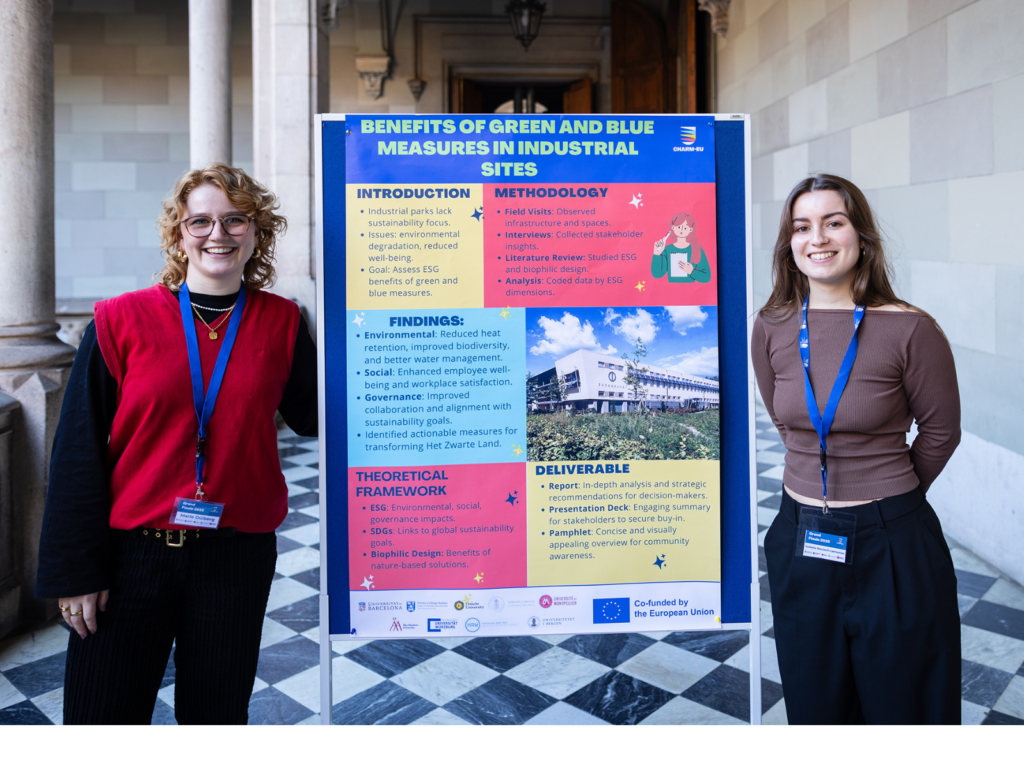
Description: Green and blue spaces are increasingly implemented in urban areas to promote sustainability and social, financial, and ecological well-being, yet remain underexplored in industrial zones. This case study examines the transdisciplinary benefits of green and blue measures at Het Zwarte Land in the Netherlands. Collaborating with Interface, a global leader in sustainability, the study explores how such measures could benefit their manufacturing site. Through qualitative data analysis and literature review, several advantages are identified, including enhanced ecological resilience, improved employee well-being, and a more sustainable industrial landscape. The findings underscore the potential of green and blue infrastructure to transform industrial areas and highlight the value of collaboration between academia, industry, and stakeholders in developing nature-based solutions. This approach offers a pathway toward more balanced and sustainable urban and industrial environments.
CHALLENGE 13: The role of CSOs in sustainable local food systems: A case study of Utrecht Natuurlijk.
Students: Didi-Anne Cieremans, Yanhui Wang, Esther Daams, Ethan Youssef
Stakeholder: Jeroen Onck, Utrecht Natuurlijk
Academic Supervisor: Julia Tschersich (University of Utrecht)
Second reader: Viktor Mihucz (Eötvös Loránd University)
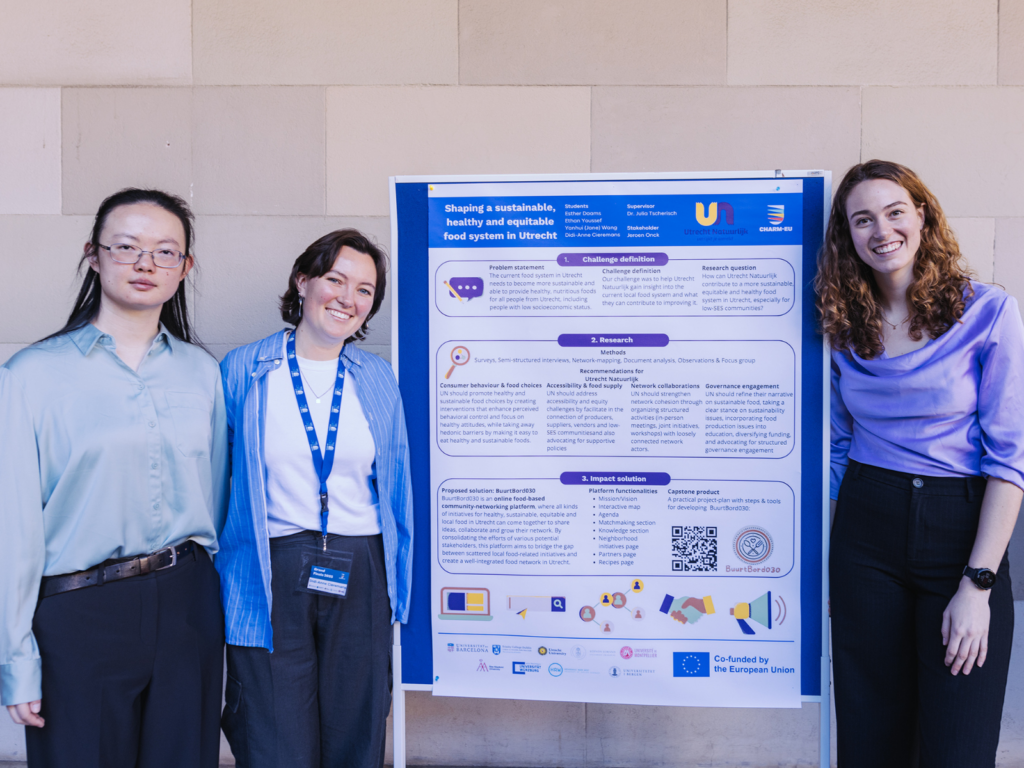
Description: Global food systems significantly harm people and planet due to unsustainable farming practices and multi-national supply chains. Localized food systems offer a potential solution to mitigating the impact of agriculture. Through a mixed methods approach, this research explores the challenges facing sustainable food systems from several angles (including policy, consumer behaviour, equity and accessibility, and complex stakeholder networks). Our findings help guide Utrecht Natuurlijk and other CSOs in supporting the development of sustainable local food systems.
CHALLENGE 14: Tipping Points, the AMOC & Health: Navigating Climate’s Delicate Balance
Students: Jasper Ewals,Katia Wagner, Juliane Mirow, Alisia Gahabka
Stakeholder: Andrea Nakoinz, KLUG Deutsche Allianz Klimawandel und Gesundheit
Academic Supervisor: Hens Runhaar and Annisa Triyanti (University of Utrecht)
Second reader: Dinan Wang (Ruhr West University of Applied Sciences)
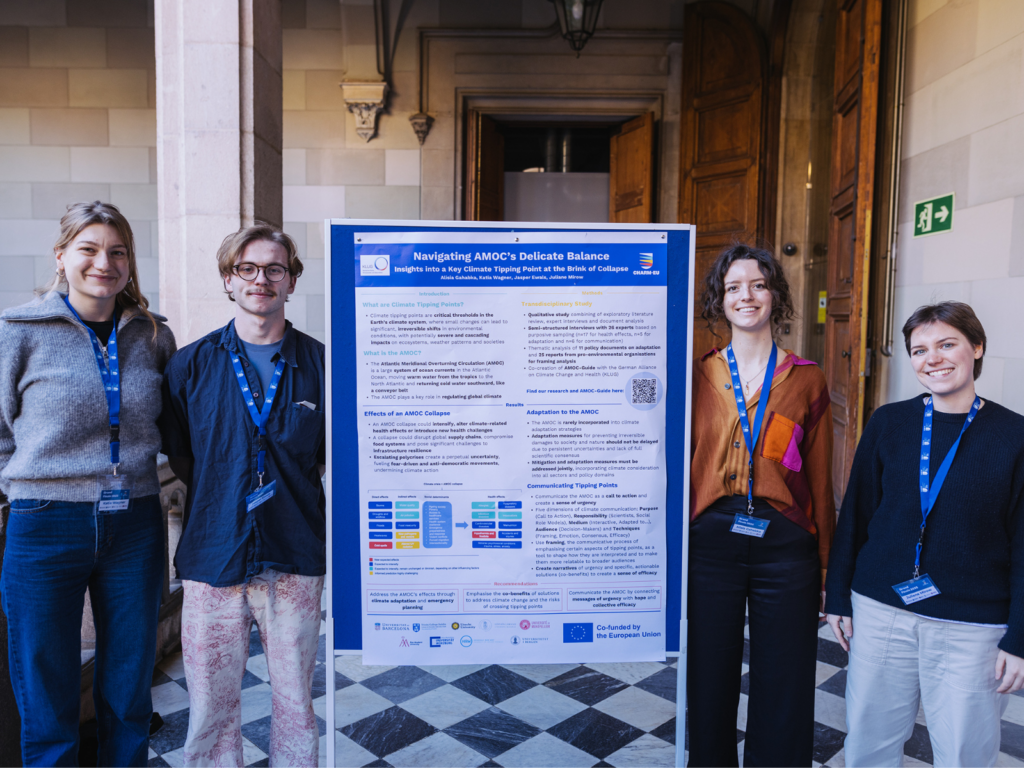
Description: The Atlantic Meridional Overturning Circulation (AMOC) is a critical component of the Earth’s climate system, regulating temperatures and weather patterns globally. However, the AMOC is at risk of weakening and even collapsing due to climate change, with profound implications for ecosystems, economies, society and health. The project seeks to address this emerging crisis by exploring the potential direct and indirect health impacts of an AMOC collapse on populations in Europe, with a focus on Germany, assessing the effectiveness of Germany’s climate adaptation strategies in mitigating these health impacts, understanding the role of framing in influencing climate policy prioritisation in Germany and identifying best practices for communicating about climate tipping points to foster pro-environmental behaviour. By bridging disciplines and engaging with stakeholders, the authors developed actionable insights to mitigate health risks and strengthen societal resilience in the face of this potential climate tipping point.
Together with Klug, the students created the following AMOC Guide, A Guide to Understanding the Uncertainty of Atlantic Meridional Overturning Circulation (AMOC) Collapse and Navigating Effective Action (available in English & German).
CHALLENGE 15: Cultural heritage & climate change: surveying and mapping the legal landscape
Students: Gianluigi Grimaldi Maliyar, Jim Gerrits, Marcello Sulsenti, Christelle Sabiteka
Stakeholder: Jana Cox, Utrecht University
Academic Supervisor: Abbie Yunita (University of Utrecht)
Second reader: Silvia Gallagher (Trinity College Dublin)
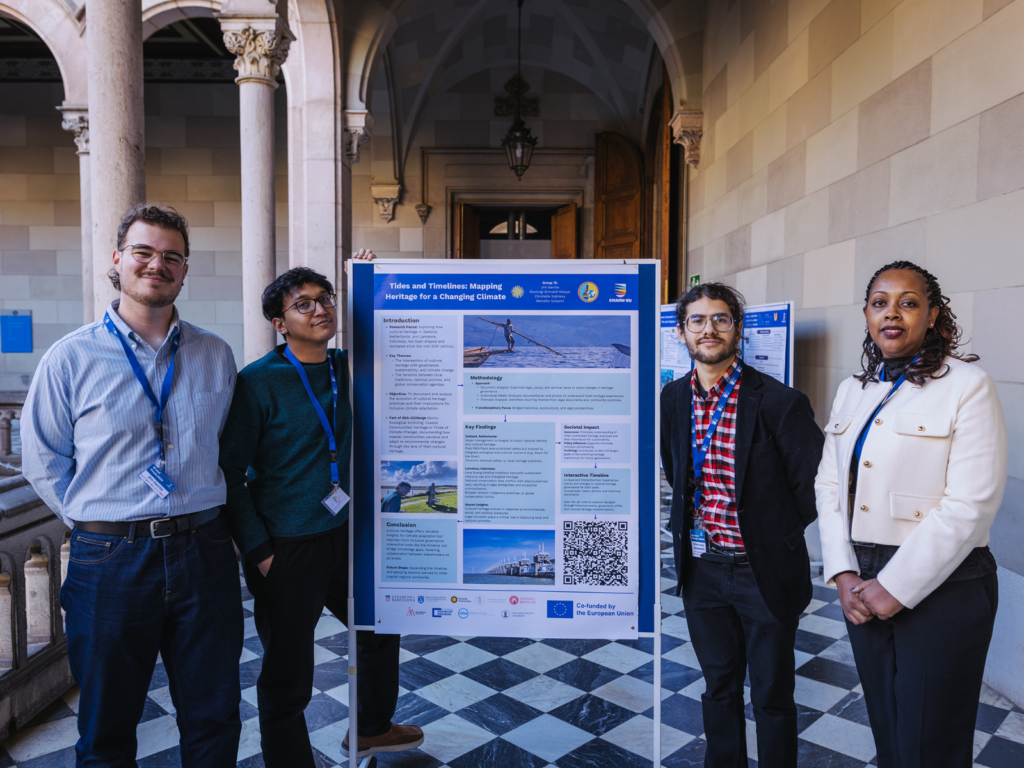
Description: As climate change manifests itself across the globe, communities need sufficient preparation and protection to keep its effects at bay. However, in practice this can be a tough challenge. This Capstone project assists SEA-CCHange, our stakeholder, in documenting the past to understand the present and prepare for the future. The project focuses on documenting sociocultural and legal changes in two coastal communities: farmers in Zeeland NL, and subsistence whalers in Lamalera ID, to better understand how they arrive at the current situation and ramp up their sociocultural and legal resiliency against future challenges.
